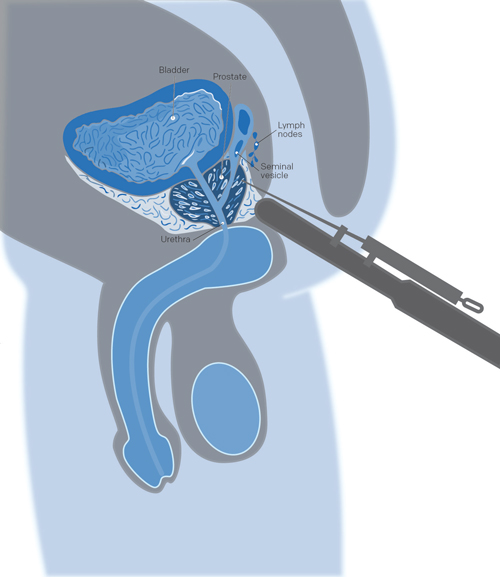Active surveillance
PROSTATE CANCER
On this page:
Overview
As surprising as it may seem, in some cases, if your cancer is confined within the prostate, your doctor may recommend waiting before you start treatment. He could opt for watchful waiting or active surveillance. There is a difference between the two approaches. Although we will address both approaches, the majority of the information on this page is about active surveillance, a treatment option for localized low-risk prostate cancer.
What is active surveillance?
Active surveillance is a way to monitor a slow-growing prostate cancer instead of treating it right away. The goal is to avoid unnecessary treatments or delay treatment and its possible side effects.
How do you explain this?
Prostate cancer is often slow-growing and can be present for many years and never spread, produce symptoms, or threaten the life of a patient. Active surveillance can be a treatment option if you are diagnosed with a prostate cancer that has a very low risk of progressing.
What is active surveillance?
Active surveillance means the healthcare team watches you closely. Treatment is given if your tumour shows signs of growing or if your cancer shows signs of an increased risk of progression. The term active surveillance gives you the impression that nothing is happening which is not necessarily the case. This is an active method based on closely monitoring your cancer’s progression.
Who can undergo active surveillance?
Active surveillance may be recommended if your cancer is still in its early stages and if it is at a low grade where it grows slowly. In this way, risks of erectile dysfunction and incontinence associated with this treatment can at least be temporarily avoided.
Choice-justifications
Choosing observation depends on a number of factors such as your general health, your age, and your family history. If your doctor feels that your death will be caused by a condition other than prostate cancer, he may recommend observation as your preferred choice of treatment.
This option is also dependent on how aggressive your cancer is. Well-differentiated, low-risk cancers are generally less aggressive and develop more slowly. Thus, you may be offered active surveillance if:
- the cancer is low grade with a Gleason score of 6
- the prostate-specific antigen (PSA) level is less than 10 ng/mL
- the cancer isn’t causing any symptoms
- you prefer not to have treatment right away so you can avoid treatment-related side effects and keep the quality of life that you’re used to
Advantages and limitations
Advantages of active surveillance
- No treatment side effects
- No change to your quality of life
Limitations of active surveillance
- Frequent follow-up visits and tests
- Induces stress and anxiety in many patients
- Natural history of each patient’s cancer can differ
Risks and complications
Although 100% reliable tools are not available to predict disease progression, the risk of progression to a more advanced stage of cancer or the loss of a treatment window is extremely rare because of your close medical follow-ups. Your doctor will start treating you as soon as symptoms or signs appear that your illness is changing. The cure rate remains the same and treatment after active surveillance is no more complicated or does not cause more side effects.
What to expect
Regular tests

Regular tests will be done about every 3–6 months to monitor your prostate cancer. This can vary depending on your situation.
- Prostate-specific antigen (PSA) test
- Physical examination, including a digital rectal exam (DRE)
- Prostate biopsy
- Prostate MRI (in some cases)
Treatment if necessary
If your cancer is growing more quickly than expected or changes grades, your doctor may recommend active treatment (radical prostatectomy, radiation therapy, and/or hormone therapy).
Around 25–30% of men under active surveillance end up having to undergo treatment because of signs of cancer growth. The cure rate remains the same as if you had not had active surveillance.
Emotions you may feel
It is normal to worry about your cancer growing and spreading faster than expected. Some men may find it too stressful to have their prostate cancer watched or monitored without active treatment. For these men, immediate therapy may be the preferred option. If you have concerns, talk to your doctor.
What you can do

Think about your values
Most men with low-risk prostate cancer have time to think about their choices. These tips may help you reach a decision.
Discuss these questions with your spouse or partner:
- Do I want to get rid of my cancer, even if I might have sexual or urinary problems?
- Which side effects would upset me most?
- Would I be okay with active surveillance, even if I am worried and have to see the doctor more often?
Review your health history
- Give your cancer care team your full personal and family medical histories.
- Ask how your age and general health could affect treatment
- Ask if you have any condition that might increase the risks of treatment, for example, conditions such as diabetes, heart problems, or bowel disease might increase your risk of sexual, urinary, or bowel problems.
Learn
Find out all of your treatment options
Ask your doctors about each choice, including benefits and side effects. Some doctors only suggest the option they know best. Typically:
- a radiation oncologist can discuss active surveillance and radiation treatment.
- a urologist can discuss active surveillance and surgery.
Talk about your choices with these physicians and your family doctor.
What is watchful waiting?
As mentioned at the beginning of this page, watchful waiting is different from active surveillance. Older men or men diagnosed with a slow-growing cancer who are suffering from other more life-threatening diseases will die before cancer poses a threat.
When all signs indicate the cancer is slow growing or that your life expectancy is less than 10 years, the selected course of action may be to wait for symptoms to appear before beginning treatment. This is called watchful waiting. It is important in certain cases to weigh the inconvenience of treatment with the risk posed by the cancer.
This surveillance mode allows initiation of a treatment only when the cancer causes symptoms, in order to treat them. In this case, the goal of any future treatment will not be to cure your cancer, but to control your symptoms. This is called palliative treatment.
If your doctor has suggested watchful waiting, your medical follow-ups will include a PSA test, a physical examination, including a digital rectal examination (DRE), a bone scan or other tests as needed and if your cancer progresses, your doctor will address it. This is a case by case approach.
We are here for you
You have questions or concerns? Don’t hesitate. Contact us at 1-855-899-2873 to discuss with one of our nurses specialized in uro-oncology. They are there to listen, support and answer your questions, and those of your family or your loved ones. It’s simple and free, like all of our other services.
Also take the time to visit each of our pages on this website, as well as our YouTube channel, in order to get familiar with the disease, our expert lectures, our section on available resources, the support that is offered to you, our events and ways to get involved to advance the cause.
Staying Informed
Pages that might interest you
Want to know more? Just click on one of the links below.
The latest PROCURE news that might interest you
Every week we publish a blog article. Here are some we have chosen for you.
- Did you say prostate cancer?
- I want to postpone my treatment… Is that wise?
- I have several treatment options… Which one to choose?
The medical content and editorial team at PROCURE
Our team is composed of urologists, and nurses certified in uro-oncology with a deep knowledge of prostate cancer and other diseases related to the genitourinary system. Meet our staff by clicking here.
Sources and references
- Prostate Cancer – Understand the disease and its treatments; Fred Saad, MD, FRCSC and Michael McCormack, MD, FRCSC, 4th et 5th editions
- Canadian Cancer Society
- Prostate Cancer Foundation-PCF.org
- National Cancer Institute-USA
- American Cancer Society
- Memorial Sloan Kettering Cancer Center
- Prostate Cancer UK
Last medical and editorial review: September 2023
Written by PROCURE. © All rights reserved




